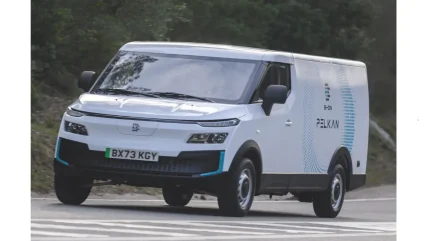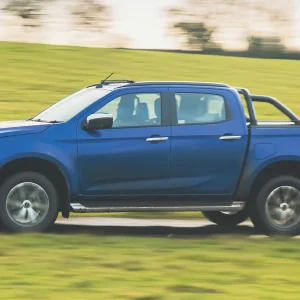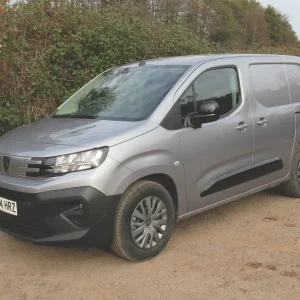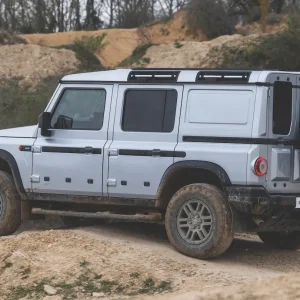
Electric van manufacturer B-ON, which was established in 2020, drew attention to the 2025 launch of its Pelkan van by giving the model its UK debut at the Commercial Vehicle Show on 23 April.
B-ON is targeting the budget end of the electric van market with the Pelkan with a starting price of around £30,000, excluding VAT. The van will be offered with a choice of two batteries, at 43.5kWh and 53.6kWh, both of which come with a 85kW (114hp) electric motor. The Pelkan 43 has a claimed range of up to 226km (140 miles), while the Pelkan 54 has a claimed range of 279km (173 miles).
Payloads are 1,350kg for the Pelkan 43 and 1,300kg for the 54, both have a load volume of 7.1m3. B-ON says a lightweight aluminium body enables the comparatively high payloads. Ford’s L2H2 E-Transit, for example, has a load volume of 10.0m3 but a payload of 1,044kg. The E-Transit, however, has a gross vehicle weight (GVW) of 3.5-tonnes compared to the Pelkan’s 3.1-tonnes; equal to that of the Vauxhall Vivaro Electric, which offers more modest load capacities of 1,000kg payload and up to 6.1m3 load space.
B-ON says the Pelkan can be fast charged from 30% to 80% in 35 minutes via the plug located in the centre of the van’s grille.
Access to the Pelkan’s load box is unconventional. It comes via twin rear doors, which open to 270º where they are held in position by flimsy hooks that look as though they would not survive frequent use during a busy working schedule. Complementing the rear doors is a hatch-like side shutter door that opens upwards above the roof height of the van. B-ON claims the Pelkan’s connectivity (B-ON Connect) will help eLCV fleets maximise uptime and minimise operating costs through monitoring driver behaviour and vehicle performance. It says its electricity and charge management software, B-ON Energy, will allow fleets to avoid peak charging times and to make use of their own power through establishing electrical energy storage units at their depots, thus avoiding expensive energy tariffs. An integrated battery management system will provide performance data to maximise range and the company says the B-ON Deployment Consultancy will be on hand to provide advice to customers making the transition to electric vans. B-ON says its software is agnostic, allowing its data to be shared with other brands’ fleet management systems.
Ben Hurford, B-ON’s aftersales director, says the firm aims to establish a network of 20 partner workshops in the UK to instal its systems and function like authorised repairers. It also plans to appoint five distributors to take the Pelkan to market.
Hurford says that as “a one product brand with one fuel type” B-ON will be able to take an “agile approach with no legacy structure to undo”, in contrast to manufacturers transitioning from diesel to electric power.
B-ON predicts the Pelkan’s biggest market will be last-mile delivery customers operating fixed routes with a back-to-depot charging structure.
It forecasts sales of up to 3,000 units in its first 12 months in the UK.
So, what’s the Pelkan like to drive? We got behind the wheel of the 43 version in left-hand drive and found it fell short in comparison to other electric vans. Performance is sluggish, lacking the eagerness off the mark that is a characteristic of EVs, and there is little feedback from the electric power steering. A circular dial on the dashboard offers just R (reverse), N (neutral) and D (drive). There is no other choice of driving modes, such as eco, normal and power, and nor are any levels of regenerative braking offered. The driver’s seat moves forward and back but the steering wheel is fixed, so the scope to find a comfortable driving position is limited. The anachronistic feel of the cabin is enhanced by the old-school handbrake and ignition key. The interior switchgear appears to have been sourced from the bargain basement.
Of more concern, the Pelkan lacks the level of safety provision and ADAS one should expect with a contemporary LCV though it does include a driver airbag, seatbelt reminders, daytime running lights and reversing sensors and camera. The Pelkan lacks the sophistication of other electric vans but it is unashamedly aimed at the budget end of the market. B-ON cites Maxus as a rival: its medium-sized e-Deliver 7 starts at about £45,000, excluding VAT, 50% more than the Pelkan.
B-ON Pelkan 43
Price (ex VAT, inc PIVG) (est) £30,000
Insurance group tbc
Warranty tbc
Service intervals tbc
Load length 2980mm
Load width (min) 1290mm
Load bay height tbc
Gross payload 1,350kg
Load volume 7.1m3
Engine size/power 85kW/114hp electric motor
Range 140 miles
CO2 0g/km





